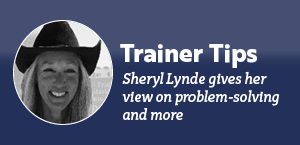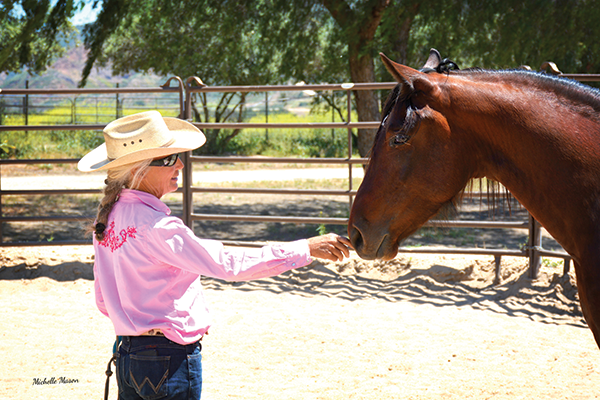By Sheryl Lynde | Horsetrader columnist

According to author and motivational researcher Carol Dweck, Ph.D. of Stanford University, there are two mindsets. Some people think their basic traits are fixed for life. This is just who they are. They are defined by their past insecurities and traits such as shy, cautious, fearful, etc., and are limited by them.
The people who fall into this category are referred to as having a “fixed mindset.” According to her book Mindset, fixed-mindset people cope with failure very differently than the “growth-mindset” people. Fixed-mindset people feel that you are either gifted with ability or you are not. You either win or you lose.If they try something that is out of their comfort zone, they feel awkward and uncomfortable at not performing at a certain level. If they have to struggle with a new concept or skill, that spells failure. They are concerned with the approval of others and fear that showing their lack of ability in a new area will compromise how they are viewed and regarded by their peers. For those with this mindset, the risk of being vulnerable is too great, and often they quit.
There is another group that believes their abilities can develop and strengthen over time. They are open to learning and experiencing new avenues, new challenges. As a matter of fact, it’s new challenges that energize them. Instead of being concerned with their reputation or being solely identified or defined by a specific skill, they are more interested in continuing to develop their talents and performance to reach higher levels. These people have the “growth mindset.”
Growth-mindset people feel that skills and abilities can be expanded with practice and effort. You either succeeded at a particular task, or you learned from it. There was no failure.The fixed mindset holds people back from reaching their true potential. The growth mindset liberates people to pursue all their dreams.
Now, these mindsets are not set in stone, and quite often people show characteristics of both. The author’s research found that “the most basic components of intelligence can be enhanced, developed and taught as well as personality traits changed.” The first step in changing is awareness.
Which mindset guides you? Be open to learning. Learning inspires and interjects new ideas into your daily approach to life. To me, all of life’s lessons are applicable to training horses. The more I learn about horses, the more I discover what I don’t know, and that excites me—there are no limits!
So what will each horse teach me today? My agenda is not fixed, but flexible and open. Success to me is helping a horse overcome a new challenge. Many times there is no crowd to validate or approve. It’s just between me and the horse. When the owner comes to watch, depending on which mindset they arrive with, they can see a change in their horse’s behavior and they will become inspired to learn new tools. They are excited to be a part of their horse’s progress. My success as a trainer does not depend on their approval or mindset; it’s the change that the horse makes that determines that. I allow each horse to teach me what they need. I have three rules: 1. I cannot get hurt, 2. the horse cannot get hurt, and 3. they must be calmer at the end of the lesson than when we began.

Jade, a 4-year-old Friesian/Quarter horse cross has arrived to get started. She had limited exposure to outside environments and people other than her owner. After transporting her to my place, the round pen was her home for the first week. It was her first experience off her property and away from her companion. It took a few days to earn her trust so that I could catch her. I have a program I developed over the years that consists of a series of steps. Each youngster must successfully complete each level before the first ride. My interest lies in building a solid foundation with each colt and instilling confidence throughout the entirety of this life-changing process. Some steps Jade sailed through incredibly well, but there was one that she was having difficulty with. If I persisted with this exercise, I was going to undermine the trust that I had earned to this point. I could see she was becoming more concerned with each repetition, so I stopped. I had to go back to a step that she understood and I ended the lesson when she was calm. Was this a failure? I didn’t think so. I thought about how I could teach her that step in a way that she could understand and accomplish. I had to change my approach.
She is teaching me to step outside my box and expand my knowledge. For that, I am grateful. Are you open to learning
–Sheryl
Leave a Comment
All fields must be filled in to leave a message.